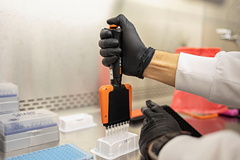Scientists at Yale University confirm the effectiveness of dexamethasone in severe COVID-19

Photo: Hannah Beier / Reuters
Scientists at Yale University have confirmed the mechanism for the development of a severe and dangerous form of COVID-19, which affects 10-20 percent of those infected with the SARS-CoV-2 coronavirus. The discovery helped to find a drug for effective treatment of the disease. This is reported in an article published in Nature Biotechnology.
Experiments on genetically modified mice have shown that the cause of complications in coronavirus infection is an excessive inflammatory response of the immune system. That being said, two well-known treatments – the use of monoclonal antibodies and the steroid dexamethasone – may help treat COVID-19 infections. However, antibodies are only effective in the early stages of the disease.
The researchers injected the coronavirus into the nasal cavity of mice, which as a result began to suffer from the typical symptoms of severe COVID-19: lung damage, weight loss, and an enhanced, sustained inflammatory immune response. In the early stages of infection, the immunosuppressant dexamethasone was fatal in mice when it suppressed an initial immune response that was critical to fighting the virus.
However, this drug helped clear the infection later in the disease by suppressing the inflammatory response that caused organ damage. This discovery will help develop new treatments for the severe course of COVID-19.

